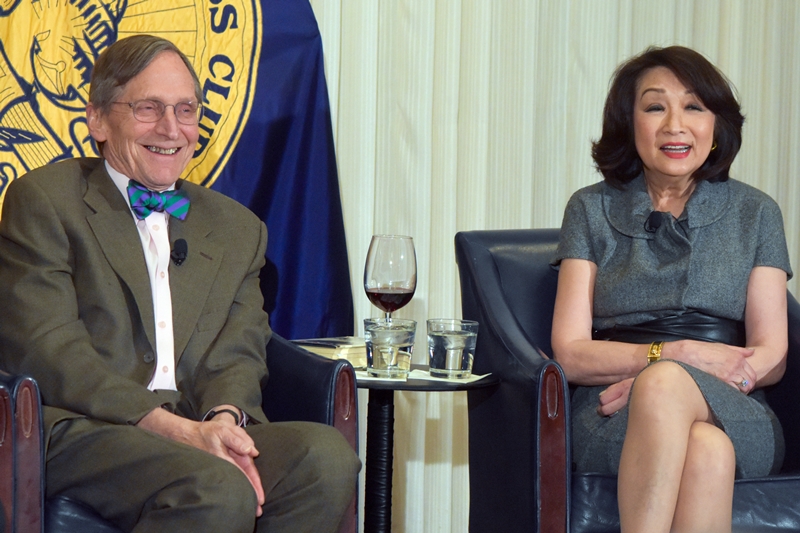'Boys on the Bus' horse-race coverage still defines elections

The Boston Globe's Tom Oliphant, left, and Connie Chung, with CBS News in 1972, tell about some of their more memorable experiences during the 1972 campaign at a Jan. 30 National Press Club event on the seminal campaign journalism book The Boys on the Bus. Photo: Alan Kotok
The reporters crammed on buses and planes to cover the wild and unpredictable presidential campaign. The Democratic field swelled with eccentric candidates competing to defeat a scandal-plagued incumbent Republican who had a tense relationship with the media.
The reporters traveled in packs and faced accusations of “getting it wrong” by assuming the front-runner would capture the nomination and, possibly, the election.
Sound familiar?
The year was 1972 — and those circumstances were recalled by a panel of three veteran political reporters who covered George McGovern’s presidential bid and experienced a seminal moment in political reporting captured in Timothy Crouse's The Boys on the Bus.
Nearly a half-century later, the book proved prophetic as the 2020 campaign season heats up amid a cut-throat 24-hour news cycle, said Carl Leubsdorf of the Dallas Morning News, Tom Oliphant of the Boston Globe and Connie Chung of CBS News.
In 1972, “pack journalism” and “horse race” were new terms, a derisive way to describe political journalists’ homogeneous coverage of the same stump speeches and the flaws in attempting to assess the campaign’s “frontrunner” at any moment. The dynamic can create a kind of flat reportage that can be manipulated by politicians.
“I think that’s one reason it’s still studied today,” Oliphant said of the book’s lasting legacy. “There’s something wrong still with two-dimensional journalism.”
Today, a campaign reporter's pursuit of the truth is even more fraught, the panelists said. For one, online journalism and social media has at times valued speed over accuracy, Chung said.
“If I didn’t have it right, I knew my head would be on the chopping block,” Chung said. Now, “I cannot ferret out the truth. I have to read all kinds of things to come to my own conclusions as to what might be the truth.”
Such a media environment often values commentary over straight news and has turned reporters into pundits with inflated personal brands, Leubsdorf said. Viewers, who often can’t tell the difference between news and opinion, have lost some trust in the media to tell it straight.
Campaign coverage is “all built around polls, which are mostly built on sand,” Leubsdorf explained. “There’s too much coverage. Everything is written, and everything is breathless. And no one is standing back and saying this is important and this isn’t.”
Crouse’s brilliance, Oliphant said, was in his criticism of the established way of covering politics. Hunter Thompson, the pioneer of gonzo journalism, was the book’s “hero,” Oliphant argued, for standing out from the pack and crafting truly original dispatches.
“Hunter’s descriptions of [‘72 candidate Ed] Muskie were more real than ours, and that was Tim’s message,” Oliphant said.
Reporters must continue to strive for access to candidates, the panelists said, and pull out from the daily coverage as much as possible to provide context and dig deeper.
It can be done. “Such incredible investigation journalism is being done today,” Chung said.
